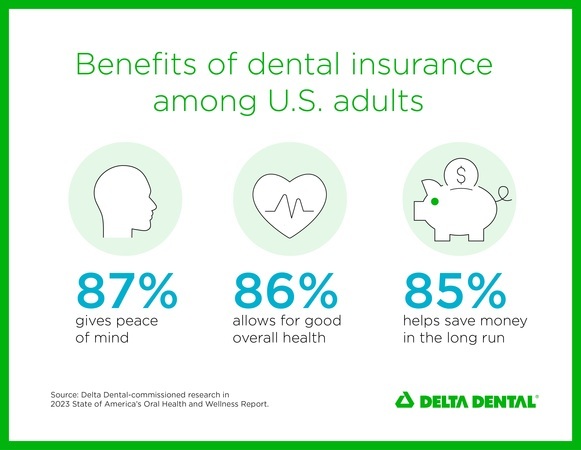82% of U.S. Adults Believe Dental Insurance is an Essential Part of Overall Wellness
By Karyn Glogowski on September 28, 2023 in Dental benefit information
 Dental insurance continues to be essential in the conversation of overall wellness as highlighted in the recently released 2023 State of America’s Oral Health and Wellness Report, a nationwide analysis of consumer opinions and behaviors relating to oral health. Findings from the Delta Dental-commissioned research, which included more than 2,000 U.S. adults and parents of children 12 and under, state that nearly 87% of U.S. adults agree that dental insurance gives them peace of mind, among other health and financial benefits. Highlights from this year's report include:
Dental insurance continues to be essential in the conversation of overall wellness as highlighted in the recently released 2023 State of America’s Oral Health and Wellness Report, a nationwide analysis of consumer opinions and behaviors relating to oral health. Findings from the Delta Dental-commissioned research, which included more than 2,000 U.S. adults and parents of children 12 and under, state that nearly 87% of U.S. adults agree that dental insurance gives them peace of mind, among other health and financial benefits. Highlights from this year's report include:
Supporting optimal overall health
- The report finds 86% of adults agree that having dental coverage allows for good overall health.
- A vast majority of adults (82%) believe that dental insurance is an essential part of overall wellness.
Fostering emotional well-being
- Nearly 9 in 10 adults (87%) agree that dental insurance gives them peace of mind.
- Further, most adults (81%) say having dental insurance instills confidence in their smile.
Providing tangible cost benefits
- More than 8 in 10 adults (85%) recognize dental insurance helps save money in the long run.
To read the full 2023 State of America’s Oral Health and Wellness Report and learn more about the report’s methodology and findings, click here.
About the research
The 2023 State of America’s Oral Health and Wellness Report is based upon Delta Dental Plans Association-commissioned research conducted between January 6 and January 23, 2023, by Material Holdings, LLC, a global insights and strategy consultancy, using an email invitation and online surveys of two audiences recruited through an opt-in panel of 1,253 parents of children ages 12 and under and 1,000 nationally representative Americans ages 18+.
Quotas were set to ensure a reliable and accurate representation of the U.S. population of adults and parents with children ages 12 and younger. The report has a margin of error of +/- 3%.